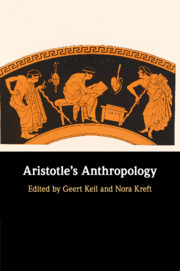Book contents
- Aristotle’s Anthropology
- Aristotle’s Anthropology
- Copyright page
- Contents
- Contributors
- Acknowledgements
- Introduction
- Part I Human Beings as Rational Animals
- Chapter 1 Aristotle on the Definition of What It Is to Be Human
- Chapter 2 Speech and the Rational Soul
- Chapter 3 Aristotle’s Peculiarly Human Psychology
- Chapter 4 The Planetary Nature of Mankind
- Part II Human Nature in the Light of Aristotle’s Biology
- Part III Aristotle’s Moral Anthropology
- Part IV Aristotle’s Political Anthropology
- Bibliography
- Index
Chapter 3 - Aristotle’s Peculiarly Human Psychology
from Part I - Human Beings as Rational Animals
Published online by Cambridge University Press: 27 May 2019
- Aristotle’s Anthropology
- Aristotle’s Anthropology
- Copyright page
- Contents
- Contributors
- Acknowledgements
- Introduction
- Part I Human Beings as Rational Animals
- Chapter 1 Aristotle on the Definition of What It Is to Be Human
- Chapter 2 Speech and the Rational Soul
- Chapter 3 Aristotle’s Peculiarly Human Psychology
- Chapter 4 The Planetary Nature of Mankind
- Part II Human Nature in the Light of Aristotle’s Biology
- Part III Aristotle’s Moral Anthropology
- Part IV Aristotle’s Political Anthropology
- Bibliography
- Index
Summary
For Aristotle, human cognition has a lot in common both with non-human animal cognition and with divine cognition. With non-human animals, humans share a non-rational part of the soul and non-rational cognitive faculties.1 With gods, humans share a rational part of the soul and rational cognitive faculties.2 The rational part and the non-rational part of the soul, however, coexist and cooperate only in human souls.3 In this chapter, I show that a study of this cooperation helps to uncover some distinctive aspects of human cognition and desire. Humans have a peculiarly expanded non-rational perceptual and desiderative range. This difference in sophistication is not merely a matter of enhanced discriminatory capacities: humans also have the peculiar ability to exercise deliberative phantasia at will, and the peculiar ability to synthesise many phantasmata into one.4 Human rational cognition, in turn, differs from divine cognition because it can be hindered or supported by non-rational cognition. Human rational cognition also involves peculiar abilities, including the ability to direct non-rational cognition and non-rational affections by means of concentration and the appropriate kinds of pleasures, pains, exhortations, and reproofs.
- Type
- Chapter
- Information
- Aristotle's Anthropology , pp. 60 - 76Publisher: Cambridge University PressPrint publication year: 2019
- 3
- Cited by



